Daily
Guaranteed Swan-Song Oscar Nom for Nicholson’s Performance in Toni Erdmann Remake
Variety‘s Justin Kroll is reporting that Jack Nicholson, whom everyone had assumed had more or less retired from acting, will star in a U.S. remake of the Oscar-nominated Toni Erdmann for Paramount.
Sources have told Kroll that that Nicholson “was a huge fan of the original and approached Paramount’s Brad Grey with the idea, and Grey immediately worked with the team at Paramount to secure the rights.”
With Nicholson about to turn 80 on 4.22 and especially given his absence from movies since 2010’s How Do You Know, his Erdmann return will be widely processed as a swan song of sorts and is therefore guaranteed to be Best Actor nominated.
You know going in that Jack will hit a homer with this role, and even if he only manages a ground-rule double he’ll be nominated anyway as a career tribute gesture.
Kristen Wiig will play Edrmann’s uptight business executive daughter. No director has been hired or at least announced.
SBIFF’s Artisans Need Love
Last night I attended my first SBIFF Artisans panel, a tribute to some of 2016’s most distinguished below-the-liners. Ten in all, interviewed individually and ensemble by Variety‘s Tim Gray. Tim did a nice, smooth job of holding it all together, but if I’d asked the questions things would have been a bit more…what’s the right term? More specific? More inquisitive? I’d get into this a bit but I’m jammed for time….sorry. Maybe I’ll fill in sometime this evening.
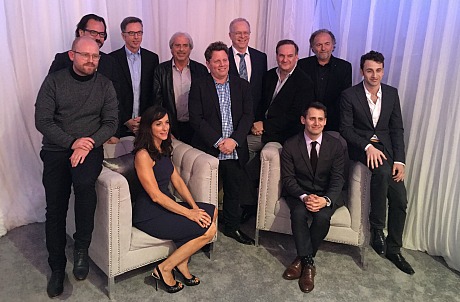
(Standing l. to r.): Moonlight dp James Laxton, Arrival editor Joe Walker, Hacksaw Ridge sound mixer Kevin O’Connell, Sully sound editor Alan Murray, Hail Caesar production designer Jess Gonchor, moderator Tim Gray, Jungle Book VFX honcho Robert Legato, Suicide Squad makeup/hair guy Alessandro Bertolazzi, La La Land composer Justin Hurwitz; (seated) La La Land & Hail Caesar costume designer Mary Zophres, La La Land song lyricist Benj Pasek.
Anolik’s Kael Tale Is Most Brilliantly Written Vanity Fair Hollywood Story in Dog’s Age
Lili Anolik‘s Vanity Fair piece about Pauline Kael’s misbegotten attempt to become a Hollywood producer and then a Paramount development executive, which happened between 1979 and ’80, is a hugely enjoyable read — wonderfully sage and lusciously phrased. It’s certainly one of the best inside-Hollywood articles I’ve consumed in ages — the story of a creative Hollywood demimonde that was destined to run aground — and a reminder of why I used to really love reading VF.
“In 1979, New Yorker film critic Pauline Kael, 59, accepted an offer from actor-director Warren Beatty, 41, to help him produce Love & Money, a script his production company had acquired and set up at Paramount,” the story begins. “Love & Money was to be the second feature of writer-director James Toback, 34, whose first feature, Fingers, Kael had reviewed ecstatically the year before. Toback was also a personal friend. She took a leave of absence from The New Yorker, headed to L.A.

“Kael and Toback began working together. She wanted substantial changes to the script. He did not want to change the script substantially. She was removed from the project. Beatty secured a new deal for her at Paramount as a creative production executive.
“At the time, Paramount’s chairman was Barry Diller, a fan. It was not to Diller, however, that she would be reporting. It was to Don Simpson, senior vp of worldwide production. There were a number of properties she wished to develop. Simpson rejected all but one. Her contract was for five months. When it lapsed, it wasn’t renewed. She returned to The New Yorker in the spring of 1980.”
That’s the basic set-up but consider the following passages, which are so beautifully concise and on-target they’re making me want to read it again.
Excerpt #1: “And didn’t that spate of Hollywood movies from 1967 to 1979, from Bonnie and Clyde to, say, Apocalypse Now, feel like a crime spree? As if the American New Wavers were pulling a fast one? The spree couldn’t last, of course. Sooner or later lawmen, i.e., studio men, would catch up. Or, worse, audiences wouldn’t. Times had changed.
“Kael understood this. In 1978’s ‘Fear of Movies,’ she wrote: ‘Now that the war has ended…[people have] lost the hope that things are going to be better…so they go to the movies to be lulled.’ But I’m not quite sure Beatty, who was considerably younger and had been knocked around far less, did.
“The chaos of the ’60s and early-to-mid-70s — Vietnam, Watergate — made for an opening, though it was closing quick. Kael prophesied the end of Pauline and Warren when she wrote of the ‘new cultural Puritanism,’ as surely as Bonnie prophesied the end of Bonnie and Clyde when she wrote of the ‘sub-gun’s rat-a-tat-tat.’ Did Kael foresee, too, the medium’s end? That the VHS revolution was just around the corner? That the 70s would be the last decade in which movies were truly a tribal experience?”
If I Was An Academy Member, I’d Vote For Octavia Spencer On Affection Alone
To any astute, fair-minded moviegoer Octavia Spencer‘s Best Supporting Actress nomination for her performance in Hidden Figures was a fitting tribute to a focused, lived-in thing. Spencer always hits that emotive sweet spot, never too showy or quiet, and her channeling of the late mathematician Dorothy Vaughn fit right into the humanistic scheme of Theodore Melfi‘s historical drama, which is now at $119 million since opening on 12.25.
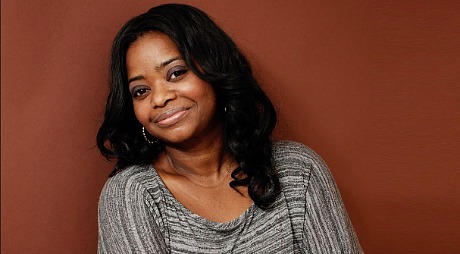
Hidden Figures Oscar nominee Octavia Spencer.
I’ve been hey-hey friendly with Octavia for roughly five and a half years, or since I first met her during a press gathering for Tate Taylor‘s The Help in July of 2011. I got to know her a little better during some Fruitvale Station press events a couple of years later, and better still during the launch of Mike Binder‘s Black or White in the fall of 2015.
We did a phoner just before I drove up to the Santa Barbara Film Festival, and it’s taken me this long to post it — my bad. Every day I’m juggling six or seven bowling pins, and I always drop one or two. Here’s our chat.
Back in ’12 or ’13 Octavia and I were in Prague at the same time (I noticed she’d tweeted about being there) and so I tweeted back “Yo, Octavia….Jeffrey Wells in Prague also!…let’s meet for brewskis!” But she never replied.
Everyone knows that Fences‘ Viola Davis is going to win the Best Supporting Actress Oscar on Sunday, 2.26. I know it, Octavia knows it, every HE reader knows it and the 20th Century Fox publicity team knows it so why play games? But Octavia is one of the friendliest and gentlest souls I know in this racket, and seeing her is always an absolute pleasure so here I am, giving her the old “hey hey” again.
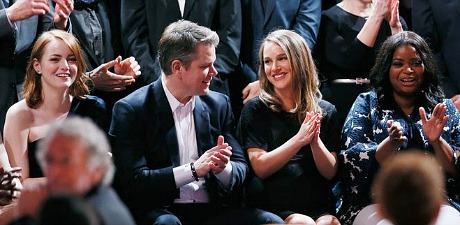
Octavia with Emma Stone, Matt Damon and Natalie Portman during Monday’s Oscar nominee luncheon.
Better Than The Last Trailer — I’ll Give It That
Keep in mind that this obviously formulaic, connect-the-dots programmer — a descendant of any number of exotic-locale, fish-out-of-water pratfall comedies going back to the Hope-Crosby road movies — won’t open until 5.12.17 so you can depend on being deluged by trailers and promos for at least the next three months. Which reminds me — I need to buy my annual plane fare to Paris/Cannes and elsewhere sooner rather than later.
Posted five or six weeks ago: “An emotionally distraught 30something woman (Amy Schumer) takes a vacation in Ecuador with her mom (Goldie Hawn), and of course fall prey to a gang of no-good slimeballs. Will the nice-guy boyfriend do the right thing, or will he cut and run?
“No one is allowed to mention anyone’s facial ‘work’ (just ask Owen Gleiberman what happens when you do) so I guess I can’t say anything.
As If We Needed Reminding….
Stated a few weeks ago, bears repeating: The primary blame for the Trump catastrophe is born, of course, by stubborn, racist, pea-brained rurals, who’ve always been and always will be fearful and uncomprehending and gullible. But the real architects of the current horror are the corporate-suckling Democratic establishment machine types and particularly the evangelical genderists (“It’s time for a woman in the White House, even one as deeply unappealing as Hillary!”).
The fatal factor wasn’t that a woman ran for President, but that the woman who ran was the braying, testy, fainting-like-a-sack-of-potatoes Hillary Clinton, who promised nothing change-y, and nothing beyond the fact that she was highly experienced (which of course she was) and would handle her Presidential duties in a cautious, responsible way (ditto).

The Joplin Biopic Headline That Wasn’t Corrected For 20 Hours
It was reported four months ago that duelling Janis Joplin pics are in preparation — one called Janis, about Joplin’s last six months of life (May through October of ’70) with Michelle Williams in the lead role.
There was another Joplin project that had been kicking around for six or seven years called Get It While You Can with Amy Adams attached or signed to play the fabled blues singer. But that ship has apparently sunk, according to relatively recent alleged statements by Adams and formerly attached director Jean Marc Vallee.
Would anyone in possession of a recent PDF screenplay for either project please send them to gruver1@gmail.com. I don’t care if Get It While You Can is dead — I want to read it anyway. Thanks.
Janis will be directed by Sean Durkin (Martha Marcy May Marlene) and produced by Peter Newman, who reportedly holds the rights to a good portion of Joplin’s music catalog and written materials. Before Williams came aboard Zooey Deschanel, Pink and Lili Taylor were going to play the Jop.
Get It While You Can had been starting and sputtering for years due to lawsuits and whatnot. Fernando Meirelles, Lee Daniels and Vallee were all going to direct at various stages in the journey. It would have apparently covered the whole sprawl of Joplin’s life from her miserable early days in Port Arthur, Texas to her accidental heroin-induced death on 10.4.70.
Difference Between Youth and Seasoned Maturity
When you’re young you tend to laugh at anything that paints any kind of clown face on normality or the status quo. I was thinking this morning about how I couldn’t stop laughing when I was 18 or thereabouts when I drove by Art’s Hot Dogs, a little stand on Route 7 in Norwalk about a mile south of the Wilton town line, and noticed that some kid had hand-painted the sign so it read “FArt’s Roessler Hot Dogs.” For some reason this made my day. I was giggling about it for hours. Now if I happen to see a commercial sign that’s been defaced I feel badly for the owner — another thing to fix and make right. Then again if I was Art (or whomever owned the stand) I would have accepted from the get-go that every so often some high-schooler would paint the extra “f.” Only natural. In a way Art was asking for it. If I’d been Art I would have always kept paint on hand with one or two brushes, always ready to go.
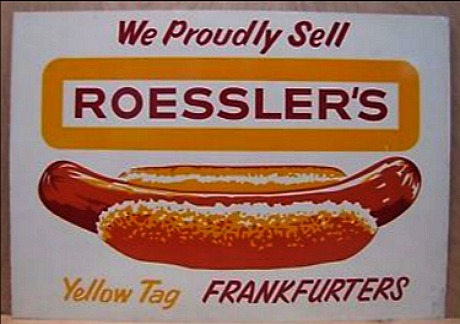
Cruise’s Finest Performance Ever — I’m Sure Of This Now
I’ve said this three or four times, but it can’t hurt to say it again. In Michael Mann‘s Collateral Tom Cruise‘s Vincent is literally the guardian angel of Jamie Foxx‘s Max. He’s tough love in a rough guise and a perfect suit. He jeopardizes and even threatens Max’s life once or twice, but ultimately he saves it. The motivator who finally gets through. And at the end, as he’s dying on a Los Angeles metro car, he’s one of God’s lonely men — “Think anybody’ll notice?”
Vincent: “Look in the mirror. Paper towels, clean cab, limo company someday. How much you got saved? Someday…someday my dream will come? One night you’ll wake up and you’ll discover it never happened. Because suddenly you are old. Didn’t happen and it never will because you were never going to do it anyway. You’ll push into memory then zone out in your Barcalounger, being hypnotized by daytime TV for the rest of your life. Don’t you talk to me about murder. All it ever took was a down payment on a Lincoln Town Car. Or that girl. You can’t even call that girl. What the fuck are you still doing driving a cab?”
Casey, Michelle SBIFF Sitdown
Last night Manchester By The Sea‘s Casey Affleck and Michelle Williams engaged with The Hollywood Reporter‘s Scott Feinberg for a 95-minute chat at Santa Barbara’s Arlington Theatre. Everything was smooth and succinct and on-point — the time flew by. Casey and Michelle are nice, patient, open-hearted people, and this, ladies and gents, was more or less their last big-deal, award-season interview. Manchester director-writer Kenneth Lonergan presented the SBIFF trophies. Hats off again to Roger Durling‘s tech team for editing and delivering several interview clips the following morning — serious pros!
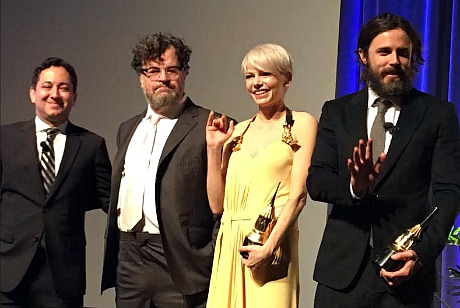
The closing of last night’s SBIFF tribute to Manchester By The Sea‘s Casey Affleck, Michelle Williams: (l. to r.) Hollywood Reporter columnist Scott Feinberg, director-writer Kenneth Lonergan, Michelle Williams, Casey Affleck.
How “Funny” Is John Wick: Chapter 2?
If John Wick: Chapter Two (Summit, 2.10) isn’t “funny”, what’s the point? I chortled and guffawed all through the original so give me that thing (i.e., a series of oafish funnybone moments punctuated by an occasional yaw-haw) or send me home.
I haven’t seen it, but in the view of Variety‘s Peter Debruge delivering man-chuckles may not be a top priority. He notes that the two John Wick flicks “accomplish what Hong Kong action fare did a quarter-century ago, seducing bloodthirsty (predominately male) audiences into appreciating an exquisitely choreographed modern ballet.” Rather than wallow in blunt carnage for carnage’s sake, John Wick: Chapter Two “achieves something more akin to dance.”
That’s cool but not enough, not for me. The Wick franchise is about dumb-fuck brutality made witty and occasionally hilarious by a smirking awareness of its own ludicrousness or, you know, a franchise absorbed by the mentality of an eight-year-old on Ritalin. Or even (can’t hurt to fantasize) a movie that would at its highest level be a kind of Duck Soup version of Grand Theft Auto.
Hell, why not try for a little Buster Keaton-like comic invention as Keanu Reeves sends way more than 75 guys (according to Debruge) to the pearly gates?
